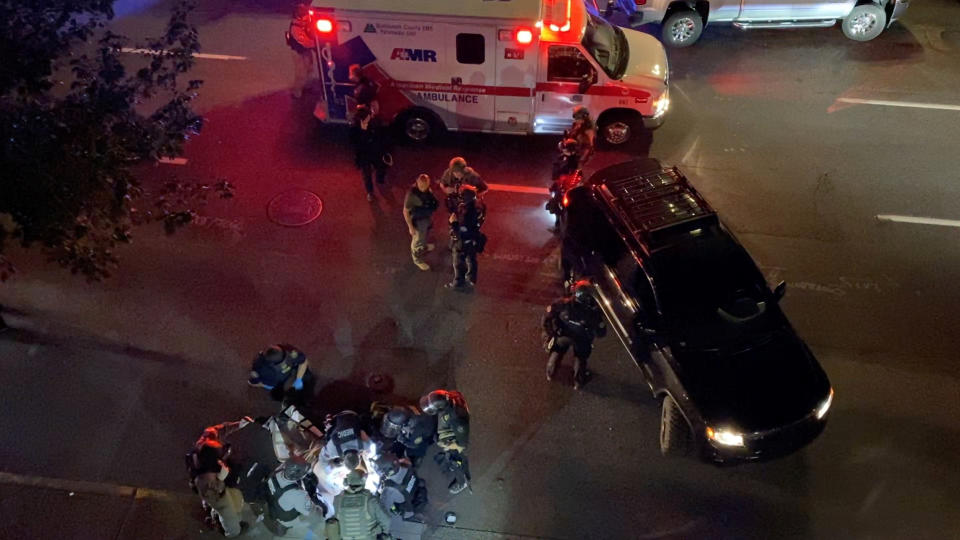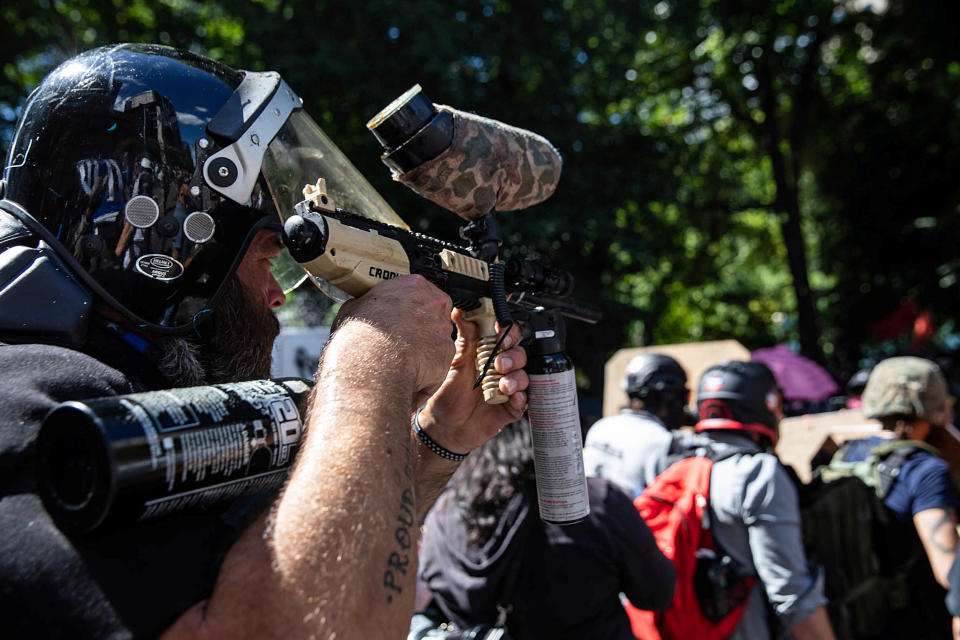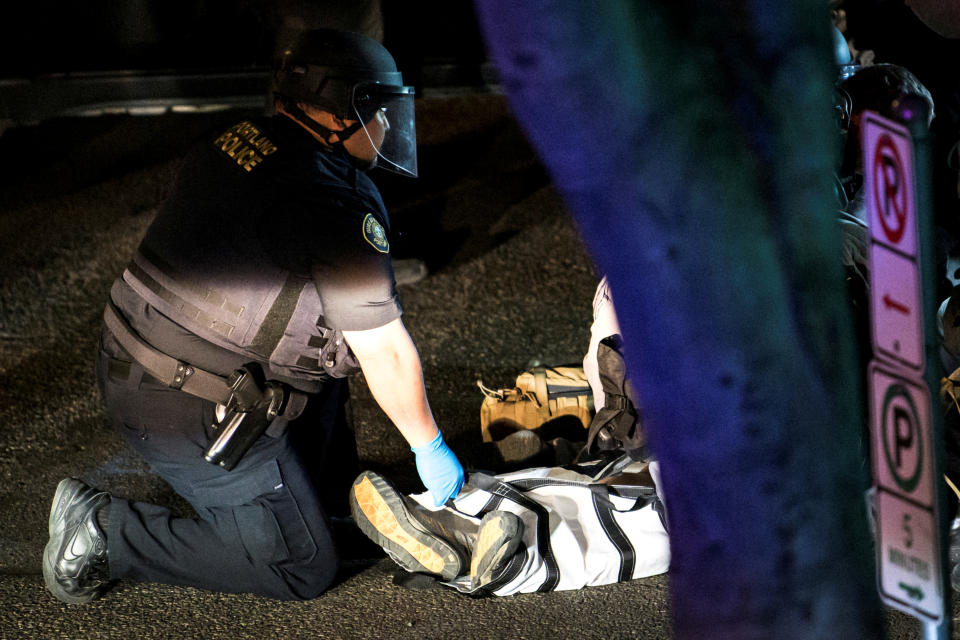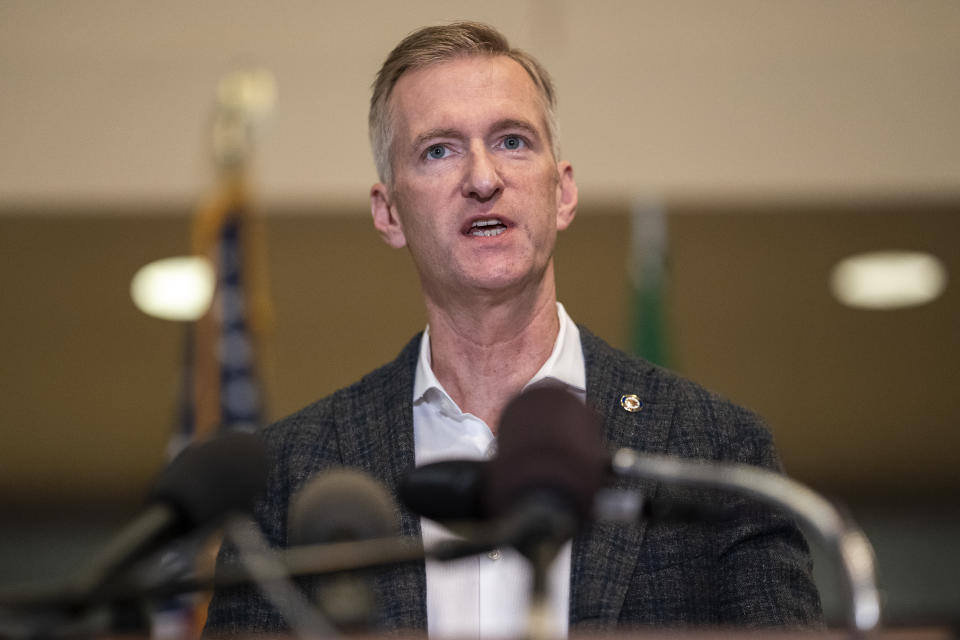Portland police missing in action against militias
In President Trump’s roster of crime-ridden, out-of-control Democratic cities, Portland, Ore., occupies a special place. Even meeting with local officials in Kenosha, Wis., on Tuesday, Trump devoted a good chunk of his remarks to the dystopia halfway across the country, where, he said, “I see it, every night it’s on the news, it’s burning.” The city of more than 650,000 has, indeed seen almost nightly protests, some peaceful and some violent, for more than three months, but until last weekend, no one had been killed in clashes among mobs from both sides of the spectrum, police and the federal law enforcement officers who were deployed there for several weeks in July to protect government property.
That changed on Saturday night, with the shooting death of a 39-year-old Portland man, Aaron J. Danielson — by a still-unidentified suspect who remains at large — signifying an even darker turn in the conflict, as the city has seemingly become a magnet for armed right-wing militias and left-wing agitators.
Trump himself was quick to blame his new go-to target, antifa “thugs,” a perception growing out of reports that the victim was a member or sympathizer of a Washington-based right-wing group known as Patriot Prayer, which participated in Saturday night’s noisy caravan of pickup trucks billed the “Trump 2020 Cruise Rally in Portland.” Reporters at the scene described seeing vehicles with out-of-state license plates, or plates covered with duct tape or removed altogether — while police stood by watching and directing traffic. That supports the conclusion by Michael German, a former FBI agent who specialized in domestic terrorism cases, that “the story that isn't being told is the escalation of violence from out-of-towners who come to Portland to wreak havoc and then go home, without police interference.”
German, now a fellow at Liberty & National Security Program of the Brennan Center for Justice, recently published a report on connections between law enforcement and white supremacist and far-right militant groups. The report highlights the history of Portland police officers with ties to white supremacists and racist groups. It concludes that the department’s failure to adequately address earlier allegations of white supremacist activity set the stage for the public to believe officers failed to do enough to control a series of violent rallies instigated by far-right militants and white supremacist groups starting in 2016.

Saturday’s rally for Trump was just the latest in a series of gatherings over the past month that have resulted in violent clashes between far-right activists and armed militants on one side, and Black Lives Matter protesters and antifascist activists on the other.
The events, which have attracted many of the same far-right groups and individual activists that have been engaged in violent brawls in Portland in recent years, have renewed questions about the Portland Police’s apparently hands-off and even friendly approach to these groups — particularly contrasted to the treatment of participants in protests demanding police accountability, which have consistently been declared riots (a formal designation in Portland police protocol) and unlawful assemblies.
“Although those events have involved significant property damage at times, they have not involved firearms or rampant brawling among demonstrators,” the Washington Post noted in a report from Aug. 22 on violent clashes between leftist protesters and far-right participants in a “Back the Blue” rally, who came to Portland “armed with paintball guns, metal rods, aluminum bats, fireworks, pepper spray, rifles and handguns.”
In that instance, police reportedly remained at a distance while “the two groups sparred for more than two hours, as people exchanged blows, fired paintballs at each other and blasted chemicals indiscriminately into the crowd,” according to the Washington Post. “People lobbed fireworks back and forth. At least one person was hit in the abdomen with a device that flashed and exploded, causing bleeding.”
In a statement, the Portland Police Bureau offered a number of explanations for why they chose not to intervene in the violence, even though the event had met the criteria for a riot: the shortage of officers available to respond to the clashes, the danger to officers, and the fact that “each skirmish appeared to involve willing participants and the events were not enduring in time.”
German called that finding “astonishing” and said it showed both that police recognized “that their tactics escalate violence,” and a double standard for dealing with violence. The police, he said, are “acknowledging who is dangerous and using that as an excuse not to take action.”
“It’s not like they’re not known people,” he continued, pointing to the fact that many of the same people have been seen at far-right gatherings in the recent past, despite, in some cases, having “outstanding charges for previous protest violence.”
German said that by failing to prevent these violent incidents from occurring, “or at least enforce the law after the assaults appear on social media,” police in Portland have essentially granted permission for such violence to continue.
“If they are allowed to shoot pellets, bear spray and guns and ram their trucks into people they are only going to attract more violent people,” German said, predicting that “as long as the police don’t intervene, the Portland victims will begin to protect themselves.”
“This violence is going to escalate if police don’t change what they are doing,” he warned.

Laura Jedeed, a freelance reporter who has covered protests in Portland over the last four years, agrees that police are inflaming the situation.
“I’ve never witnessed the level and systemic amount of police brutality against protesters as I have in the past three months,” Jedeed told Yahoo News. She added that “There seems to be a real double standard” in who police are targeting.
“I don’t think they understand how angry this town is.”
Jedeed was one of the first Portlanders to sound the alarm on her Twitter account about the Saturday rally, when she came across a Facebook posting about the event, warning that it had the potential to be explosive. The reason for her concern: Over the past several weeks, right-wing groups have been appearing at the nightly BLM protests, bringing a new level of ferocity and violence to the demonstrations, which in early July had appeared to be fading away, with numbers dwindling to a hundred or so a night.
But later that month, when federal agents, without identifying uniforms or badges, began throwing protesters into unmarked cars and whisking them off to jail, the demonstrations “came roaring back to life,” she said. As federal agents have withdrawn from the city, right-wing groups began showing up — “some Proud Boys, some QAnon,” as well as Patriot Prayer members, and others from another local conservative group called Portland’s Liberation. The right-wing demonstrators were maskless, some dressed in blue, others wearing logos saying “Blue Lives Matter.” In Jedeed’s observation, they were afforded much gentler treatment than the Black Lives Matter protesters. “It became increasingly clear that the police were taking a side in the protests,” she said — the side of the right-wing groups.
Jedeed said she witnessed right-wing counterprotesters beating the left-wing protesters with batons, throwing firecrackers at them and spraying them with bear mace. (It was easy, she said, to tell the groups apart by masks alone: The left-wing groups she says almost always wore them, but the right-wing groups were typically maskless — as were most of the police.)
On Saturday, the day of the pro-Trump rally, at around 4:30 she witnessed hundreds and hundreds of vehicles at their meeting point, the parking lot of the Clackamas Town Center, roughly 10 miles southeast of Portland. Most of the vehicles were trucks, “flying all manner of flags, including some Confederate flags,” revving their engines and creating a cloud of oily black smoke. The proposed route shown on the Facebook event page was to circle downtown, but when they started off for the rally on wheels, severe gridlock ensued in the parking lot — ultimately lessened by the arrival of police who directed them toward 82nd Ave. Jedeed found it odd that the police didn’t stop the many vehicles with no license plates, or with numbers that had been obscured.
Other Portlanders similarly suspect outsiders are involved in the recently rising tensions in the city. “Suddenly I’m seeing license plates from Kentucky, Texas and Arizona,” said Joan Hess, a retired corrections officer. “They didn’t come for the beer.” Others says the right-wing groups are coming from the more conservative towns elsewhere in Oregon, or from Seattle or Vancouver, Wash.

Jim Redden, a reporter for the Portland Tribune, a twice-weekly, free local paper, said he also sees the shooting as part of a dangerous dynamic that’s been playing out in the city since Trump was elected, an event that triggered frequent demonstrations and led to brawls between right-wingers and left-wingers in downtown Portland that went on for months. But he puts much of the blame on Portland’s own “self-professed anarchists, who just want to protest everything.”
“Whenever there’s another protest going on, they hang around and break windows and stuff like that,” Redden told Yahoo News. “Now they’ve rebranded themselves as antifa — but it’s the same group just calling themselves a different name.”
While Redden noted that the reappearance of right-wing groups like Patriot Prayer in Portland during demonstrations in August exacerbated the clashes with left-wing protesters, he said, “It was pretty out of control even before they came back. After George Floyd’s killing there were huge protests that went on for two months with a lot of rioting and destruction.”
Asked to respond to charges from some that Portland Police officers have enabled the recent escalation of violence instigated by right-wing groups in the city by not intervening in recent clashes, Portland Police public information officer Sgt. Kevin Allen referred Yahoo News to the department’s earlier statement that “clearly spelled out why we did not step in to the event on Aug. 22.
“And it was discussed at length by the mayor and police chief at a press conference yesterday,” Allen wrote in an email to Yahoo News, along with a link to a YouTube video from a press conference held Sunday in response to the shooting.
As for how the Portland Police Bureau plans to prevent such violence going forward, Allen wrote: “We will not discuss any specific tactical plans going forward, however [we] will continue to utilize the resources we have to address criminal behavior while we employ de-escalation strategies where appropriate.”
“We do not take into account political ideology,” he continued. “We fully support free speech rights.”
At a press conference on Sunday, Mayor Ted Wheeler condemned the fatal shooting over the weekend, and urged people from both sides of the political spectrum to come together to help “stop the violence.”
“For those of you saying on Twitter this morning that you plan to come to Portland to seek retribution, I’m calling on you to stay away,” Wheeler said. “You of course have a constitutional right to be here, but we’re asking you to stay away and work with us to de-escalate this situation.”

The shooting in Portland came less than a week after 17-year-old Kyle Rittenhouse was arrested and charged with shooting three people, killing two, amid unrest in Kenosha, Wis. Evidence from Rittenhouse’s social media presence indicates that the teenager was an aspiring police officer and Trump supporter who even appeared in the front row at one of the president’s rallies in Iowa earlier this year.
Trump has spoken in defense of Rittenhouse, while expressing sympathy for the victim in Portland and sharp criticisms of the city’s mayor.
Against the wishes of both Kenosha Mayor John Antaramian and Wisconsin Gov. Tony Evers, Trump traveled to the embattled Wisconsin city on Tuesday, where he condemned violence and property damage resulting from some recent protests as acts of “domestic terror” and questioned the existence of systemic racism within law enforcement, which has been the core issue driving recent protests.
He also continued to take credit for Evers’s decision to activate Wisconsin’s National Guard in response to the unrest that unfolded in Kenosha after video circulated of the 29-year-old Blake being shot seven times in the back by a Kenosha police officer.
“I strongly support the use of the National Guard in other cities,” Trump said, insisting that his administration is “ready, willing, and able to send in” federal forces to cities such as Portland, an offer that city’s Democratic Mayor Ted Wheeler formally declined in a recent letter to president Trump.
On Monday, acting Homeland Security Secretary Chad Wolf responded to Wheeler’s letter on the president’s behalf, writing that “due to a lack of action throughout the summer, Portland and its law-abiding residents continue to suffer from large-scale looting, arson, and vandalism — even killing.”
Wolf, who oversaw the controversial deployment of federal agents from DHS to Portland earlier this summer, urged Wheeler to “request federal assistance to restore law and order in Portland,” adding that, “at the same time, President Trump has made it abundantly clear that there will come a point when state and local officials fail to protect its citizens from violence, the federal government will have no choice but to protect our American citizens.”
In Kenosha, Trump seemed to suggest that he may once again deploy federal agents to Portland against the wishes of local officials.
“We could solve that problem in less than an hour in Portland, so I hope they call,” said Trump. “And at some point ... we’ll just have to do it ourselves.”
_____
Read more from Yahoo News:


